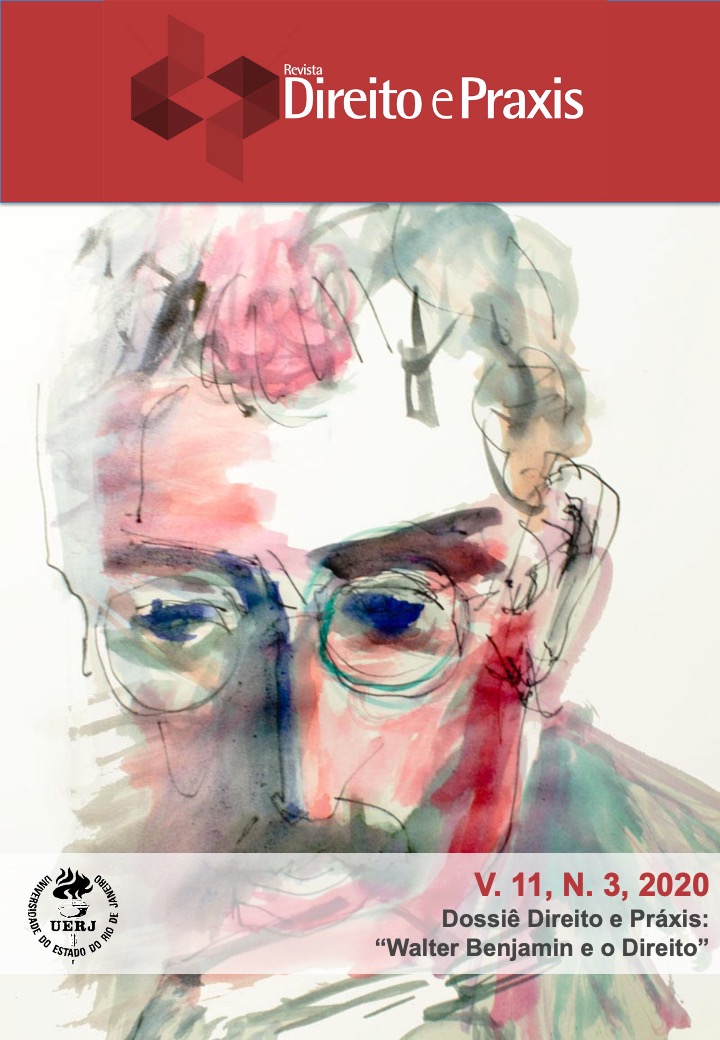“Relações Perigosas”: Walter Benjamin e Carl Schmitt no crepúsculo de Weimar / “Dangerous Connections”: Walter Benjamin and Carl Schmitt at the Weimar twilight
Palavras-chave:
Walter Benjamin, Carl Schmitt, Estado de exceção / Walter Benjamin, State of exception.Resumo
DOI: 10.1590/2179-8966/2020/52675
Resumo
Enzo Traveso analisa a relação entre Walter Benjamin e Carl Schmitt no contexto da crise europeia dos anos 1930. Benjamin consagrou a Schmitt algumas passagens de seu livro sobre o drama barroco alemão (1928) e em 1930 escreveu a ele uma carta em que enfatizou suas afinidades com o teórico da ditadura e do decisionismo. Schmitt não respondeu a carta, mas a conservou e esta tornou-se a base de suas discussões com o filósofo judeu-alemão Jakob Taubes após a 2ª Guerra Mundial. Traverso sublinha a impossibilidade de diálogo entre a forma revolucionária do messianismo judaico defendido por Benjamin e a forma conservadora da Teologia Política elaborada por Schmitt. Ambos dividiam uma visão da história como uma catástrofe crescente e reivindicaram a necessidade de uma decisão política, mas suas terapias eram radicalmente opostas: Benjamin identificou o advir da era messiânica com a revolução proletária, enquanto Schmitt acolheu o nazismo como uma espécie de moderno katechon (o vencedor do Anticristo na tradição católica). (Resumo enviado pelo autor aos editores que toma como base a tradução espanhola de seu texto)
Palavras-chave: Walter Benjamin; Carl Schmitt; Estado de exceção.
Abstract
Enzo Traverso analyzes the relationship between Walter Benjamin and Carl Schmitt in the context of the European crisis of the 1930s. Benjamin devoted to Schmitt several passages of his book on German Trauerspiel (1928) and in 1930 wrote a letter to him, where he emphasized his affinities with the theoretician of the dictatorship and “decisionism”. The latter did not responded but conserved this letter, which was the basis of his discussions with the Jewish-German Philosopher Jakob Taubes after the II World War. Traverso underlines the impossibility of a dialogue between the revolutionary form of Jewish Messianism defended by Benjamin and the conservative form of Political Theology elaborated by Schmitt. Both shared the vision of History as a growing catastrophe and claimed the necessity of a political decision, but their therapies were radically opposed: Benjamin identified the coming of the Messianic era with the proletarian revolution, whereas Schmitt welcomed Nazism as a sort of modern Katechon (the defeater of anti-Christ in the Catholic tradition).
Keywords: Walter Benjamin; Carl Schmitt; State of exception.
Downloads
Publicado
Como Citar
Edição
Seção
Licença
Os textos são de exclusiva responsabilidade de seus autores.
É permitida a reprodução total ou parcial dos artigos da Revista Direito e Práxis, desde que citada a fonte.
Este trabalho está licenciado sob uma Licença Creative Commons 4.0, Atribuição-Sem Derivações.
Esta licença permite copiar e redistribuir o material em qualquer suporte ou format para qualquer fim, mesmo que comercial, desde de que citada a autoria original.
This work is licensed under a Creative Commons Attribution 4.0 International License.




